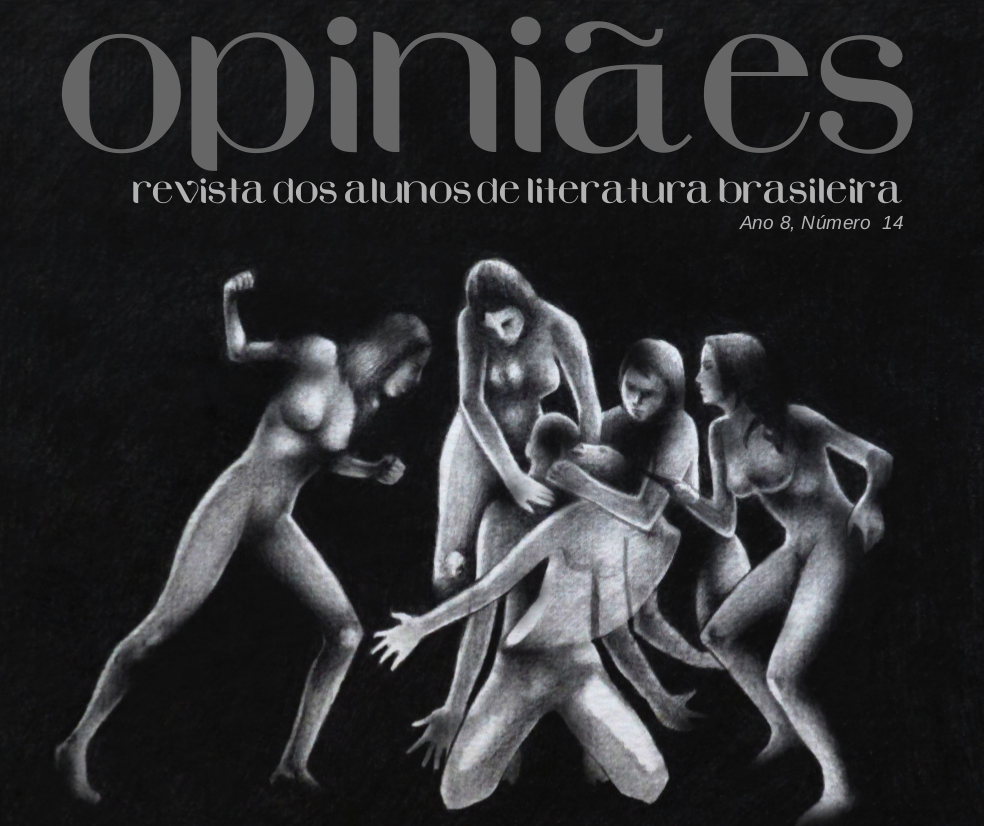A hora dos ruminantes, from José J. Veiga
the world seen by the eyes of Manarairema
DOI:
https://doi.org/10.11606/issn.2525-8133.opiniaes.2019.155003Keywords:
Modernization, Deadlocks, Reconfiguration of reality, Nostalgia, AberrantAbstract
This article aims at developinfg the hipothesis that the novel A hora dos ruminantes, written by José J. Veiga, re-elaborates, in a consequent way, the deadlocks of the processo f modernization in Brasil in the second half of the twentieth century. The key argument is that the core of the novel is located in the way the citizens of these towns in the countryside of Brazil, as the isolated Manarairema, reconfigure their reality in light of a cenario of quick changes. Assigning to modernity the sign sometimes of the progress or of the elimination of misery, sometimes of the death of the ancient traditions, the manairema people turn to idealizing a peaciful past in the countryside. However this reconfiguration of reality is not limited to a feeling of nostalgia, it overcomes the limits of daily life and reaches the aberrant: the oxen and the dogs that invade the town at the end of the novel, mixing familiar elements of countryside life and fantasy, are the prediction f a grate change: modernity. It is sugestted, in the article, that the aberant in Veiga can be connected to the a figurative construction that gets closer to our daily reality than to a fantasy world.
Downloads
References
CANDIDO, Antonio. A educação pela noite e outros ensaios. São Paulo: Editora Ática, 1989.
CARVALHO, Leonice de Andrade. Objetos e turbulência: uma análise da contística veiguina. Tese (doutorado em Teoria literária e literatura) - Universidade de Brasília, Brasília, 2015.
HOLANDA, Sérgio Buarque. Raízes do Brasil. 27ª ed. São Paulo: Companhia das letras, 2014.
JUNIOR, Caio Prado. Formação do Brasil Contemporâneo. 1ª ed. São Paulo: Companhia das Letras, 2011.
LUCAS, Fábio. Razão e emoção literária. São Paulo: Duas Cidades, 1982.
PRADO, Antonio Arnoni. Prefácio de A hora dos ruminantes. In: VEIGA, J. J. A hora dos ruminantes. 1ª ed. São Paulo: Companhia das Letras, 2015.
SANTOS, Nedilson César Rodrigues dos. Adequação e impasses de uma narrativa: uma leitura de A hora dos ruminantes, de José J. Veiga. Dissertação (Mestrado em teoria literária e literatura comparada) – Universidade de São Paulo, São Paulo, 2008.
TURCHI, Maria Zaíra. As variações do insólito em José J. Veiga. In: ORGANON: v. 19, n. 38-39, págs. 147 – 158, 2005. Disponível em < http://seer.ufrgs.br/organon/article/view/30065/18650>.
VEIGA, J. J. A hora dos ruminantes. 1ª ed. São Paulo: Companhia das Letras, 2015.
WILLIAMS, Raymond. O campo e a cidade na história e na literatura. BRITO, Paulo Henriques (trad.). São Paulo: Companhia das Letras, 1989.
Downloads
Published
Issue
Section
License
A revista Opiniães não exerce cobrança pelas contribuições recebidas, garantindo o compartilhamento universal de suas publicações. Os autores mantêm os direitos autorais sobre os textos originais e inéditos que disponibilizarem e concedem à revista o direito de primeira publicação, com o trabalho simultaneamente licenciado sob a Licença Creative Commons Attribution que permite o compartilhamento do trabalho com reconhecimento da autoria e publicação inicial nesta revista.



